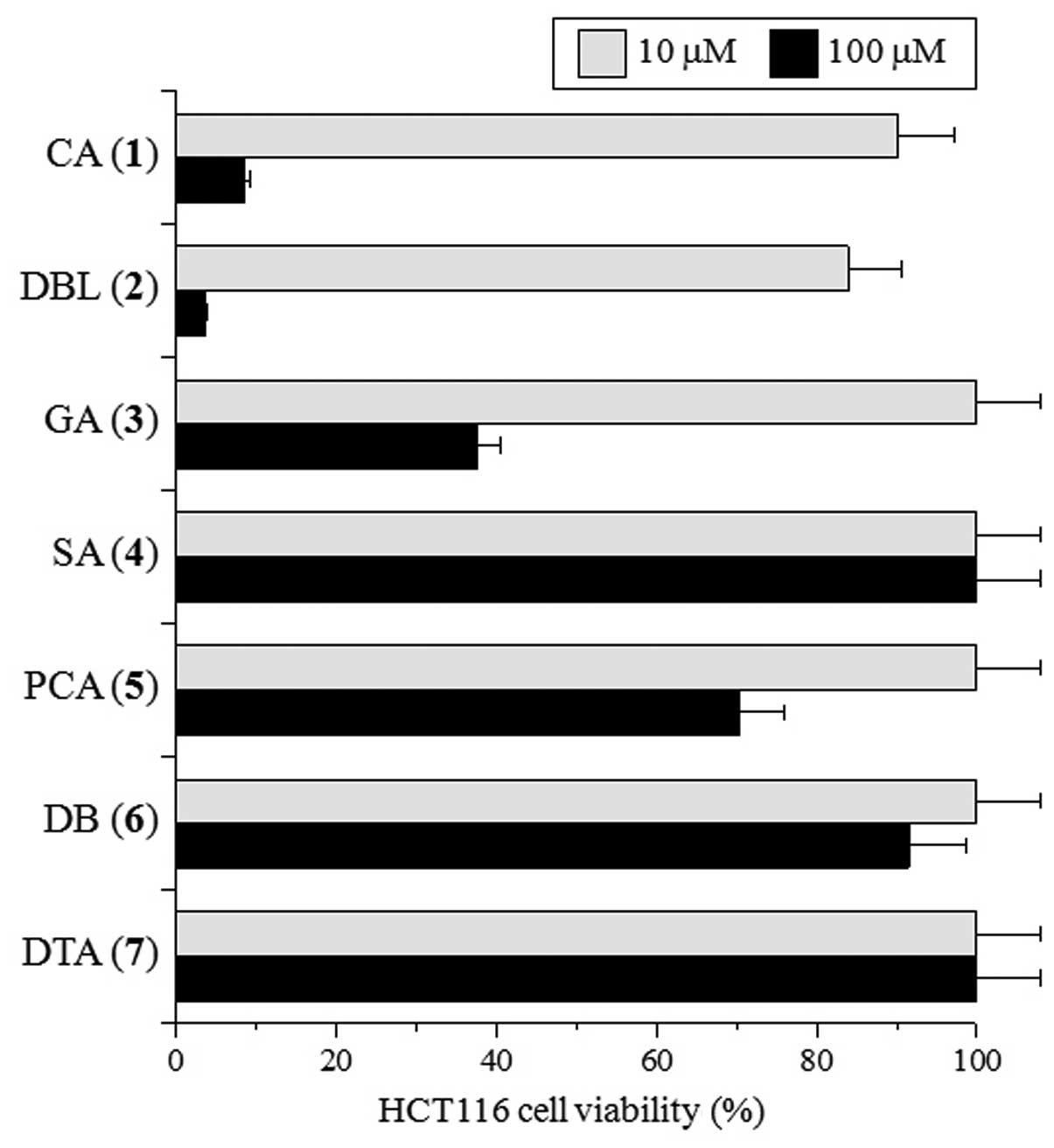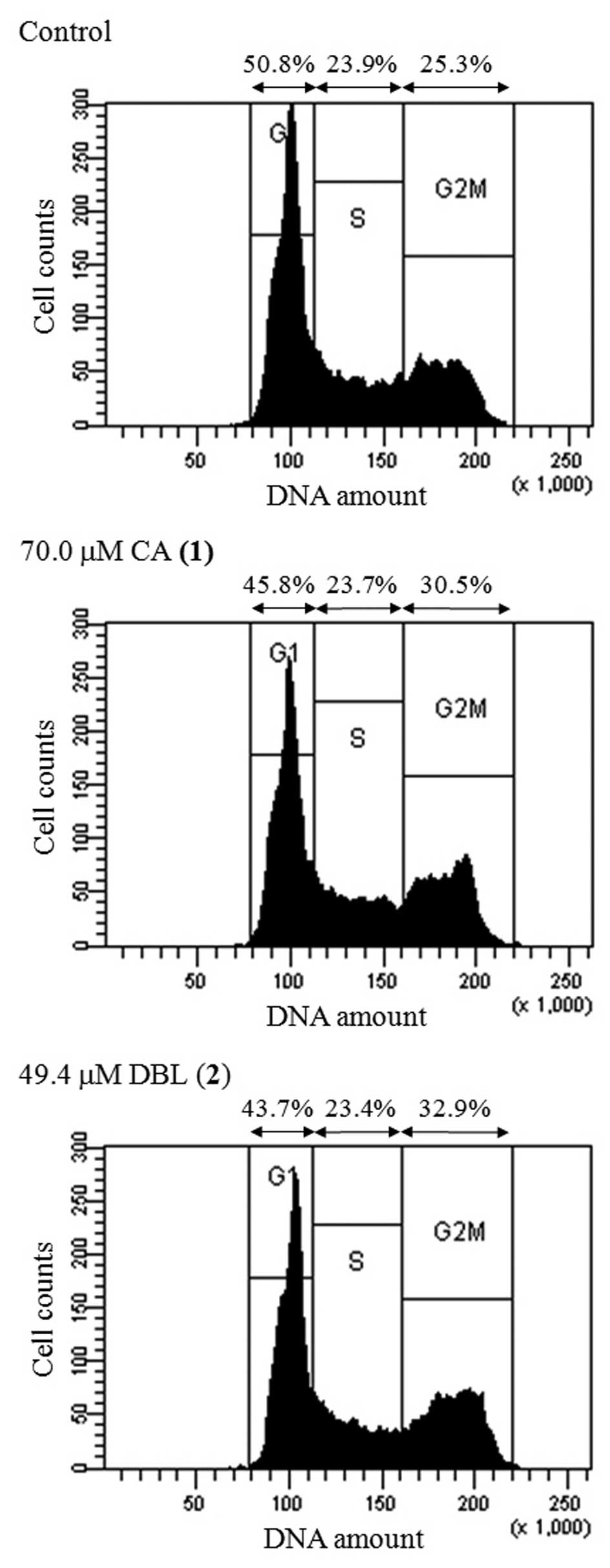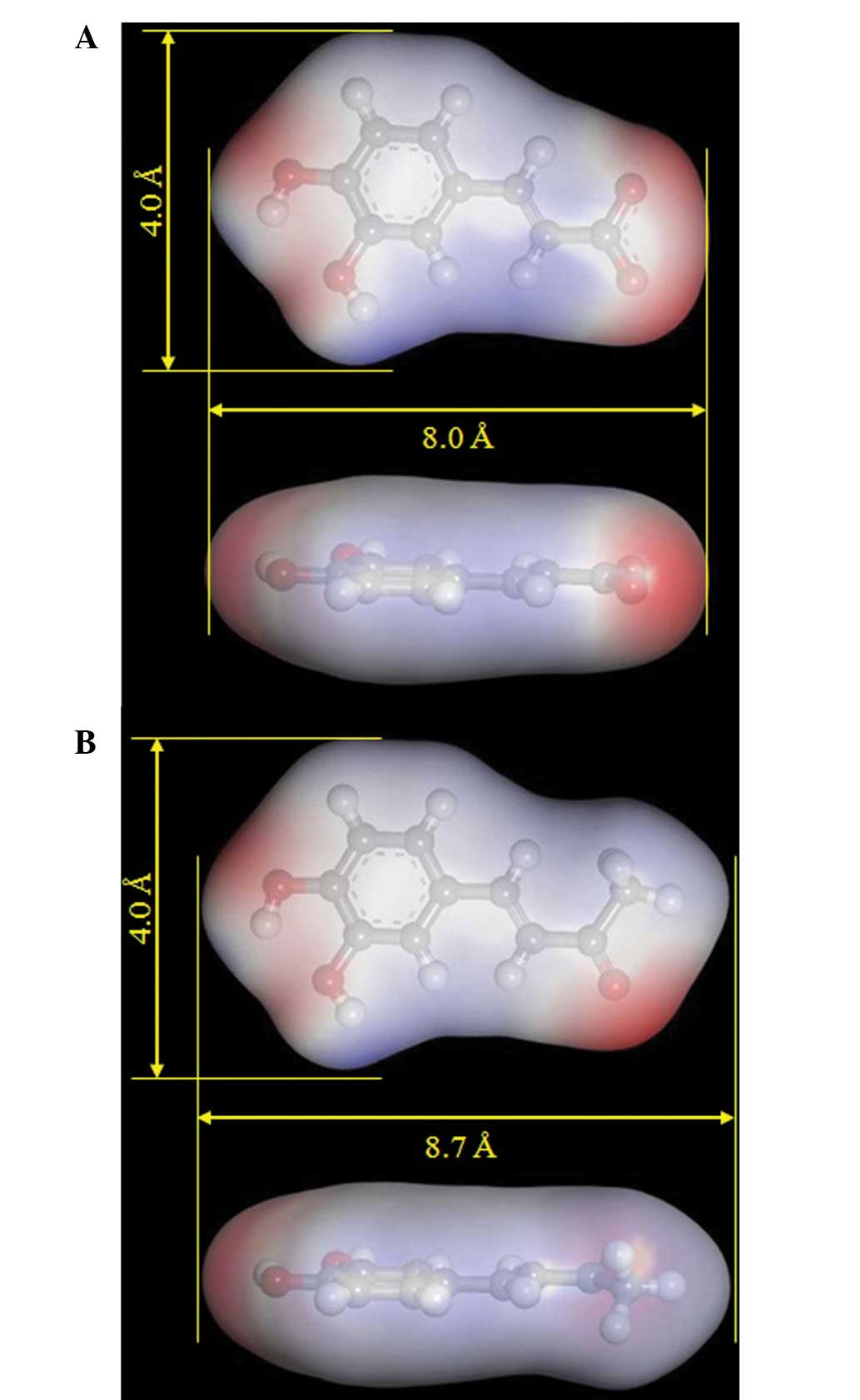|
1
|
Liu RH: Potential synergy of
phytochemicals in cancer prevention: mechanism of action. J Nutr.
134:3479S–3485S. 2004.PubMed/NCBI
|
|
2
|
Surh YJ: Cancer chemoprevention with
dietary phytochemicals. Nat Rev Cancer. 3:768–780. 2003. View Article : Google Scholar : PubMed/NCBI
|
|
3
|
Kornberg A and Baker TA: DNA Replication.
2nd edition. WD Freeman and Co; New York, NY: pp. 197–225. 1992
|
|
4
|
Bebenek K and Kunkel TA: DNA repair and
replication. Advances in Protein Chemistry and Structural Biology.
Yang W: 69. 1st Edition. Elsevier; San Diego, CA: pp. 137–165.
2004
|
|
5
|
Hubscher U, Maga G and Spadari S:
Eukaryotic DNA polymerases. Annu Rev Biochem. 71:133–163. 2002.
View Article : Google Scholar
|
|
6
|
Lange SS, Takata K and Wood RD: DNA
polymerases and cancer. Nat Rev Cancer. 11:96–110. 2011. View Article : Google Scholar : PubMed/NCBI
|
|
7
|
Loeb LA and Monnat RJ Jr: DNA polymerases
and human disease. Nat Rev Genet. 9:594–604. 2008. View Article : Google Scholar : PubMed/NCBI
|
|
8
|
Wang JC: DNA topoisomerases. Annu Rev
Biochem. 65:635–692. 1996. View Article : Google Scholar
|
|
9
|
Berdis AJ: DNA polymerases as therapeutic
targets. Biochemistry. 47:8253–8260. 2008. View Article : Google Scholar : PubMed/NCBI
|
|
10
|
Liu LF: DNA topoisomerase poisons as
antitumor drugs. Annu Rev Biochem. 58:351–375. 1989. View Article : Google Scholar : PubMed/NCBI
|
|
11
|
Sakaguchi K, Sugawara F and Mizushina Y:
Inhibitors of eukaryotic DNA polymerases. Seikagaku. 74:244–251.
2002.(In Japanese).
|
|
12
|
Nakajima Y, Saito Y and Konishi T:
Antioxidant small phenolic ingredients in Inonotus obliquus
(persoon) Pilat (Chaga). Chem Pharm Bull (Tokyo). 55:1222–1226.
2007. View Article : Google Scholar : PubMed/NCBI
|
|
13
|
Shashkina M, Shashkin P and Sergeev A:
Chemical and medicobiological properties of chaga (review).
Pharmaceut Chem J. 40:560–568. 2006. View Article : Google Scholar
|
|
14
|
Nakajima Y, Nishida H, Matsugo S and
Konishi T: Cancer cell toxicity of small phenolic compounds from
Chaga [Inonotus obliquus (persoon) Pilat]. J Med Food.
12:501–507. 2009.PubMed/NCBI
|
|
15
|
Nakajima Y, Nishida H, Nakamura Y and
Konishi T: Prevention of hydrogen peroxide-induced oxidative stress
in PC12 cells by 3,4-dihydroxybenzalacetone isolated from Chaga
[Inonotus obliquus (persoon) Pilat]. Free Radic Biol Med.
47:1154–1161. 2009.PubMed/NCBI
|
|
16
|
Fresco P, Borges F, Marques MP and Diniz
C: The anticancer properties of dietary polyphenols and its
relation with apoptosis. Curr Pharm Des. 16:114–134. 2010.
View Article : Google Scholar : PubMed/NCBI
|
|
17
|
Huang WY, Cai YZ and Zhang Y: Natural
phenolic compounds from medicinal herbs and dietary plants:
potential use for cancer prevention. Nutr Cancer. 62:1–20. 2010.
View Article : Google Scholar : PubMed/NCBI
|
|
18
|
Kelloff GJ: Perspectives on cancer
chemoprevention research and drug development. Adv Cancer Res.
78:199–334. 2000. View Article : Google Scholar : PubMed/NCBI
|
|
19
|
Esteves M, Siquet C, Gaspar A, et al:
Antioxidant versus cytotoxic properties of hydroxycinnamic acid
derivatives - a new paradigm in phenolic research. Arch Pharm
(Weinheim). 341:164–173. 2008. View Article : Google Scholar : PubMed/NCBI
|
|
20
|
Tamai K, Kojima K, Hanaichi T, Masaki S,
Suzuki M, Umekawa H and Yoshida S: Structural study of
immuno-affinitypurified DNA polymerase α-DNA primase complex from
calf thymus. Biochim Biophys Acta. 950:263–273. 1988.
|
|
21
|
Date T, Yamaguchi M, Hirose F, et al:
Expression of active rat DNA polymerase β in Escherichia
coli. Biochemistry. 27:2983–2990. 1988.
|
|
22
|
Umeda S, Muta T, Ohsato T, Takamatsu C,
Hamasaki N and Kang D: The D-loop structure of human mtDNA is
destabilized directly by 1-methyl-4-phenylpyridinium ion
(MPP+), a parkinsonism-causing toxin. Eur J Biochem.
267:200–206. 2000. View Article : Google Scholar : PubMed/NCBI
|
|
23
|
Oshige M, Takeuchi R, Ruike R, Kuroda K
and Sakaguchi K: Subunit protein-affinity isolation of Drosophila
DNA polymerase catalytic subunit. Protein Expr Purif. 35:248–256.
2004. View Article : Google Scholar : PubMed/NCBI
|
|
24
|
Kusumoto R, Masutani C, Shimmyo S, Iwai S
and Hanaoka F: DNA binding properties of human DNA polymerase η:
implications for fidelity and polymerase switching of translesion
synthesis. Genes Cells. 9:1139–1150. 2004.
|
|
25
|
Ohashi E, Murakumo Y, Kanjo N, et al:
Interaction of hREV1 with three human Y-family DNA polymerases.
Genes Cells. 9:523–531. 2004. View Article : Google Scholar : PubMed/NCBI
|
|
26
|
Shimazaki N, Yoshida K, Kobayashi T, Toji
S, Tamai T and Koiwai O: Over-expression of human DNA polymerase λ
in E. coli and characterization of the recombinant enzyme.
Genes Cells. 7:639–651. 2002.
|
|
27
|
Mizushina Y, Tanaka N, Yagi H, et al:
Fatty acids selectively inhibit eukaryotic DNA polymerase
activities in vitro. Biochim Biophys Acta. 1308:256–262. 1996.
View Article : Google Scholar : PubMed/NCBI
|
|
28
|
Mizushina Y, Yoshida S, Matsukage A and
Sakaguchi K: The inhibitory action of fatty acids on DNA polymerase
β. Biochim Biophys Acta. 1336:509–521. 1997.
|
|
29
|
Ogawa A, Murate T, Suzuki M, Nimura Y and
Yoshida S: Lithocholic acid, a putative tumor promoter, inhibits
mammalian DNA polymerase β. Jpn J Cancer Res. 89:1154–1159.
1998.PubMed/NCBI
|
|
30
|
Yonezawa Y, Tsuzuki T, Eitsuka T, et al:
Inhibitory effect of conjugated eicosapentaenoic acid on human DNA
topoisomerases I and II. Arch Biochem Biophys. 435:197–206. 2005.
View Article : Google Scholar
|
|
31
|
Nakayama C and Saneyoshi M: Inhibitory
effects of 9-β-D-xylofuranosyladenine 5′-triphosphate on
DNA-dependent RNA polymerase I and II from cherry salmon
(Oncorhynchus masou). J Biochem. 97:1385–1389. 1985.
|
|
32
|
Mizushina Y, Dairaku I, Yanaka N, et al:
Inhibitory action of polyunsaturated fatty acids on IMP
dehydrogenase. Biochimie. 89:581–590. 2007. View Article : Google Scholar : PubMed/NCBI
|
|
33
|
Soltis DA and Uhlenbeck OC: Isolation and
characterization of two mutant forms of T4 polynucleotide kinase. J
Biol Chem. 257:11332–11339. 1982.PubMed/NCBI
|
|
34
|
Lu BC and Sakaguchi K: An endo-exonuclease
from meiotic tissues of the basidiomycete Coprinus cinereus:
its purification and characterization. J Biol Chem.
266:21060–21066. 1991.PubMed/NCBI
|
|
35
|
Ishiyama M, Tominaga H, Shiga M, Sasamoto
K, Ohkura Y and Ueno K: A combined assay of cell viability and in
vitro cytotoxicity with a highly water-soluble tetrazolium salt,
neutral red and crystal violet. Biol Pharm Bull. 19:1518–1520.
1996. View Article : Google Scholar : PubMed/NCBI
|
|
36
|
Hsu FL, Chen YC and Cheng JT: Caffeic acid
as active principle from the fruit of Xanthium strumarium to
lower plasma glucose in diabetic rats. Planta Med. 66:228–230.
2000. View Article : Google Scholar : PubMed/NCBI
|
|
37
|
Giovannini L, Migliori M, Filippi C, et
al: Inhibitory activity of the white wine compounds, tyrosol and
caffeic acid, on lipopolysaccharide-induced tumor necrosis factor-α
release in human peripheral blood mononuclear cells. Int J Tissue
React. 24:53–56. 2002.PubMed/NCBI
|
|
38
|
Simonetti P, Gardana C and Pietta P:
Caffeic acid as biomarker of red wine intake. Methods Enzymol.
335:122–130. 2001. View Article : Google Scholar : PubMed/NCBI
|
|
39
|
Almeida AA, Farah A, Silva DA, Nunan EA
and Glória MB: Antibacterial activity of coffee extracts and
selected coffee chemical compounds against enterobacteria. J Agric
Food Chem. 54:8738–8743. 2006. View Article : Google Scholar : PubMed/NCBI
|
|
40
|
Chung MJ, Walker PA and Hogstrand C:
Dietary phenolic antioxidants, caffeic acid and Trolox, protect
rainbow trout gill cells from nitric oxide-induced apoptosis. Aquat
Toxicol. 80:321–328. 2006. View Article : Google Scholar : PubMed/NCBI
|
|
41
|
Bailly C: Topoisomerase I poisons and
suppressors as anticancer drugs. Curr Med Chem. 7:39–58. 2000.
View Article : Google Scholar : PubMed/NCBI
|


















